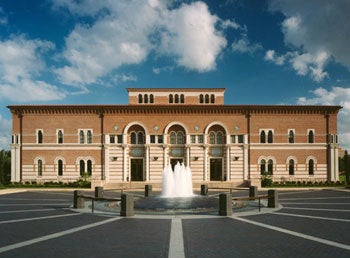Competition, not cooperation, will incentivize emissions reductions in China, says Baker Institute expert
HOUSTON – (April 16, 2021) – The United States should compete with China on climate change initiatives rather than cooperate with its insincere regime, according to an analysis co-authored by an expert from Rice University’s Baker Institute for Public Policy.
Gabriel Collins, the Baker Botts Fellow in Energy and Environmental Affairs at the Baker Institute, and Andrew Erickson, professor of strategy at the U.S. Naval War College and associate in research at Harvard University’s Fairbank Center for Chinese Studies, wrote in a piece for Foreign Affairs that Chinese President Xi Jinping's "bullish talk of combating climate change is a smokescreen for a more calculated agenda.”
Collins is available to speak to the news media about U.S. and Chinese policy.
“Chinese policymakers know their country is critical to any comprehensive international effort to curb greenhouse gas emissions, and they are trying to use that leverage to advance Chinese interests in other areas,” the authors wrote.
Collins and Erickson expect Beijing to use negotiations on climate issues to shield its poor domestic human rights record and regional aggression.
“Worse still, it will probably demand economic, technological and security compromises from the United States and its allies — such as their agreeing not to challenge China’s coercive activities in the South China Sea — for which those countries would receive little, if anything, in return,” they wrote.
If the U.S. makes concessions to win China’s cooperation on greenhouse gas emissions, the authors argue that Beijing will only make empty promises or those it will fulfill only by default if the country’s economic growth slows.
“In Chinese foreign policy, climate change does not hold the same environmental and moral importance that it does for many American policymakers. Beijing’s fundamental goal remains promoting the Chinese Communist Party’s rule, image and influence,” they wrote.
Curbing global greenhouse gas emissions requires Beijing’s participation in international negotiations. In the last decade, China emitted nearly twice as much total carbon dioxide as the U.S. — and that gap will only widen as policy incentives in Beijing preserve coal as a core energy source, according to Collins and Erickson.
The best option, they argue, is to compete with China on combatting climate change and reducing emissions via a global coalition that can put pressure on China and its exporters.
“Such a coordinated system would make carbon-intensive Chinese goods less competitive and reduce the disadvantages that manufacturers in the United States face from coal-fired Chinese competitors,” Collins and Erickson wrote.
A coalition of like-minded partners, like those from member states of the Organization for Economic Cooperation and Development, could create a “critical mass” needed to pressure China into sourcing its energy supplies more sustainably, they argue.
“Climate competition will allow the United States to win twice, thwarting both Chinese coercion and potentially irreversible ecological damage. Negotiating proactively with China cannot curtail climate change; Beijing would impose unacceptable costs while failing to deliver on its end of any bargain,” Collins and Erickson wrote. “Only a united climate coalition has the potential to bring China to the table for productive negotiations, rather than the extractive ones it currently pursues. And only the bottom line — not moral exhortations — will convince China to mend its ways and seriously cut its emissions.”
To schedule an interview with Collins, or for more information, contact Avery Franklin, media relations specialist at Rice, at averyrf@rice.edu or 713-348-6327.
-30-
Related materials:
Foreign Affairs: https://www.foreignaffairs.com/articles/united-states/2021-04-13/competition-china-can-save-planet.
Collins bio: https://www.bakerinstitute.org/experts/gabe-collins/.
Follow Rice News and Media Relations via Twitter @RiceUNews.
This news release can be found online at news.rice.edu.
Founded in 1993, Rice University’s Baker Institute ranks as the No. 1 university-affiliated think tank in the world and the No. 1 energy think tank in the world. As a premier nonpartisan think tank, the institute conducts research on domestic and foreign policy issues with the goal of bridging the gap between the theory and practice of public policy. The institute’s strong track record of achievement reflects the work of its endowed fellows, Rice University faculty scholars and staff, coupled with its outreach to the Rice student body through fellow-taught classes — including a public policy course — and student leadership and internship programs. Learn more about the institute at www.bakerinstitute.org or on the institute’s blog, http://blog.bakerinstitute.org.

